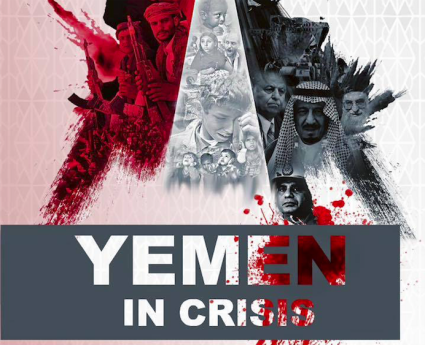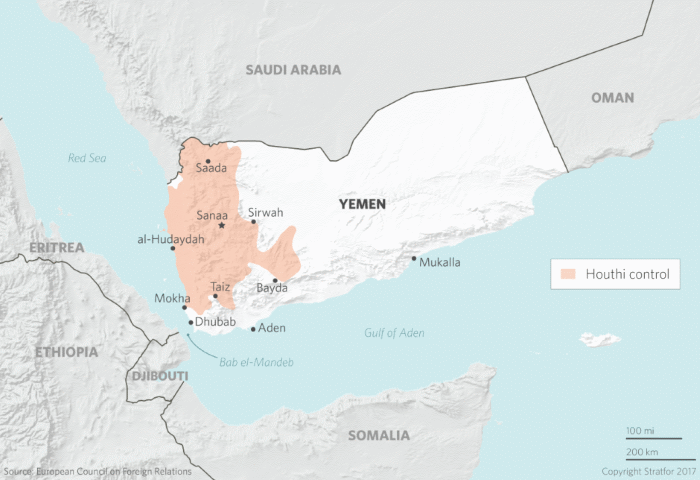 Summary: Stratfor explains what’s happening in Yemen, and the reasons for our mad involvement in that civil war. It is important to understand, with rumors swirling that Trump plans to expand our involvement while loosening the rules of engagement (i.e., more civilian casualties). Our involvement will makes it our war, just as our involvement in Iraq, Afghanistan, and Libya made us partially responsible for the devastation of those nations.
Summary: Stratfor explains what’s happening in Yemen, and the reasons for our mad involvement in that civil war. It is important to understand, with rumors swirling that Trump plans to expand our involvement while loosening the rules of engagement (i.e., more civilian casualties). Our involvement will makes it our war, just as our involvement in Iraq, Afghanistan, and Libya made us partially responsible for the devastation of those nations.
Introduction.
This week, it will have been two years since Saudi Arabia and the coalition led by the Gulf Cooperation Council (GCC) began an aerial campaign against Yemen’s Houthi rebels. But a resolution to the conflict is as far out of reach as ever. Political negotiations have come to a standstill, and though the U.N. special envoy to Yemen is expected to call for renewed peace talks, if past attempts are any guide, there isn’t much hope that they will succeed. Yemeni President Abd Rabboh Mansour Hadi has so far proved unwilling to relinquish power, and Houthi rebels — along with the General People’s Congress they support — have been equally reluctant to cede the territory and arms they’ve acquired, leaving little room for negotiation.
Militarily, the conflict is just as stagnant. In the past few weeks, however, Yemeni government forces backed by GCC-led airstrikes made advances in the Nehim and Sirwah districts, northeast of the capital of Sanaa. Clashes broke out after Houthi fighters encroached on government-held territory in Saada. The coalition also launched airstrikes in a number of other north-central Yemeni districts, including Shabwa and al-Jawf. The modest advances prompted Hadi to say last week that the Yemeni army was in control of 80% of the country. The claim is somewhat exaggerated, but though Sanaa remains under Houthi control, the coalition has indeed gained valuable coastal and inland territory. Still, the victories have not come easily: Government forces have struggled through heavily mined territory in central and northern Yemeni districts, slowing their advances.
Area of Yemen under Houthi control.
Analysis: Operation Golden Spear.
The GCC coalition’s Operation Golden Spear has pushed forward along Yemen’s western coast, moving up from the Bab el-Mandeb strait to Dhubab and on through Mokha. Coalition forces are currently working to establish control over population centers while making sure their flanks are protected. And in reclaiming most of the Taiz coastline, they have nearly achieved their goal. Government forces are now just 80-90 miles (129-145 kilometers) south of the port city of al-Hudaydah, one of the most critical assets under Houthi control. Al-Hudaydah is a major transit point for goods, including food and medicine, to the rest of northern Yemen. Though the coalition holds the ports of Mukalla, Mokha and Aden (where 20% of Yemen’s imports arrive), al-Hudaydah port is still a piece of critical infrastructure that strengthens the Houthis’ position.
Whether coalition forces move to actually take al-Hudaydah soon depends on whether the United States will pursue a more aggressive policy in Yemen alongside the GCC. The United States has cooperated with the GCC’s Saudi-led air campaign in Yemen since it began in 2015, helping with targeting, fueling and advising. But Washington has been careful to avoid direct participation in the civil war. (The United States is deeply involved in operations against al Qaeda in the Arabian Peninsula in the south and center of the country, but they are largely separate from the civil war.) The closest it has come to intervention was last fall, when it bombed Houthi radar sites in direct retaliation for attacks on U.S. naval ships in the Bab el-Mandeb strait. But that could soon change.
U.S. Defense Secretary Jim Mattis has reportedly asked the White House to lift the limits on military support for the coalition put in place under former U.S. President Barack Obama. Specifically, his request relates to shared intelligence, logistics and planning, and it will be reviewed for a month to consider its ramifications. If the United States becomes more involved in the coalition fight against the Houthis, it will become embroiled in Yemen’s civil war, in close alignment with Saudi Arabia. This would have political significance that stretches well beyond the conflict’s eventual end, when the United States would be expected to help manage post-conflict negotiations.
Why we fight in Yemen.
“Army General Joseph Votel {CENTCOM commander} told the House Armed Services Committee on Wednesday that the U.S. does not want Yemen to be used as a sanctuary for attacks against the U.S. and allies …” (Source: Defense News.)
— So America’s area of operations is Earth, as this logic justifies US intervention anywhere.
Despite the fact that nothing has been officially decided in Washington, some Gulf countries are already praising the possibility of greater U.S. involvement in the Yemeni conflict. The United Arab Emirates has hailed the potential intensification of U.S. efforts as it considers its own offensive on al-Hudaydah. Emirati Ambassador to the United States Yousef al Otaiba said this week that he believed the United States, Saudi Arabia and the United Arab Emirates were on the “same page” with respect to Yemen.
Iran’s presence in Yemen is the biggest motivator the United States has for increasing its own role in the country. Though the Houthis are known to have some ties to Iran, concrete evidence of those ties emerged last week. The EU-funded Conflict Armament Research organization determined that seven Houthi drones captured by the United Arab Emirates in central Yemeni districts were produced by Iran. Supporting this evidence, news reports said that Quds Force commander Qassem Soleimani met with Houthi officials sometime in the past month to discuss stepping up Iran’s military support to the Houthis — which, if proven true, would be just the sort of intelligence that could justify greater U.S. involvement in Yemen.
In fact, as limited as the United States’ role has been up to this point, it has largely been prompted by the desire to ease GCC allies’ concerns about the Joint Comprehensive Plan of Action (JCPOA) struck between Washington and Tehran. The U.S. government wanted to reassure its regional allies, particularly Saudi Arabia, that it was not abandoning them or letting Iran operate with impunity in the region by supporting the Houthis.
Today, two years later, the JCPOA is still very much intact, and even Saudi officials have expressed a desire to keep it in place. Despite pressure on Washington to renegotiate the deal, few regional actors are interested in scrapping it altogether; instead, most just want it policed more stringently. But fears of Iran meddling in a strategic theater such as the Bab el-Mandeb strait are still alive and well, and they could push the United States to immerse itself further in the Yemeni civil war.

No comments:
Post a Comment